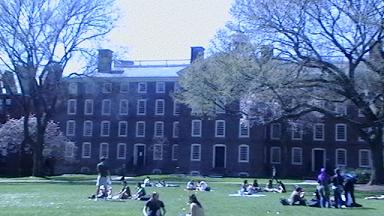Sports Are a Tough Admissions Hook for Elite Schools
From pre-school through high school, you’re encouraged to play team sports, and for good reason: exercise is healthy; team interaction improves a student’s social skills; teamwork teaches group dynamics, and so on. When you reach high school, another benefit is added to the mix — playing a sport well can help you gain admission to college. This possibility, although real, is fraught with caveats in the context of admissions to top-tier institutions like the Ivy League schools.
Gone are the days when admissions offices at elite schools sought well-rounded high school seniors with a wide range of extracurricular activities like participation in sports. These days, even the leadership demonstrated by being a team captain doesn’t, in and of itself, carry much weight at top schools. The only applicants who can successfully use athletic ability as an admissions hook are those who excel in a sport in which an influential coach at a school is seeking their specific talent.
Admissions offices place a premium on applicants who will contribute value to their institution’s student body. To gain admission, a student’s athletic talent needs to be of sufficiently high level that a coach will approach the admissions office on behalf of an academically qualified student. The student-athlete needs to be talented enough to not merely make the coach’s team, but to help the team win.
Coaches follow the sports news at the high school level and know of the accomplishments of many athletes. In addition, admissions officers may refer a qualified applicant who excels in a sport to the appropriate coach. All the same, a student’s best approach involves seeking the attention of the right coach at institutions of interest prior to submitting applications.
Inevitably, a coach’s influence on admissions at a school varies by sport. Because they’re the biggest revenue earners, the football and basketball coaches are the most influential. The next tier is baseball, softball, soccer, and lacrosse along with track & field, swimming, tennis, golf, crew, fencing, field hockey, and others.
Students should make themselves aware of the level of competition to which they’re aspiring. A few elite universities, such as MIT, Caltech, and Chicago, compete in NCAA Division III, which is a lower level of play relative to Division I and within which coaches ordinarily wield less influence than their Division I peers. Most top-tier institutions compete in Division I, but there is a wide range of competitiveness in this Division.
Since the Ivy League schools don’t offer scholarships and successful applicants must have achieved a high level of academic excellence, they’re far from the best conference in the country competitively. Last year’s College Bowl Series champion, Alabama, would have overwhelmed Yale’s team, the 2017 Ivy champions. But players on an Ivy League team such as Yale’s need to satisfy rigorous academic requirements. Hence, Ivy teams, students, and alumni care most about how they fare against each other more than how they may rank nationally.
The competitive bar at other academically elite Division I schools varies and is often set higher than in the Ivy League. For example: Duke, Georgetown, UVA, Boston College, and UNC-Chapel Hill field top-notch basketball teams every year and often play deep into the NCAA post-season tournament. Notre Dame, UT-Austin, USC, Michigan, and Wisconsin compete at a high level in both football and basketball. Stanford, UCLA, USC, and UC-Berkeley compete in the Pac-12 conference, one of the toughest in the country.
Aspiring Ivy League student-athletes should bear in mind that the target they need to hit is quite small. On average, only 6% of students at Division I schools participate in NCAA sports. Of the approximately 120,000 undergraduates in the eight Ivy League schools, this equates to 7,200 student athletes playing intercollegiate sports. Let’s assume that each freshman class contributes 25% of athletes. This would mean that roughly1,800 athletes are accepted in a typical Ivy League admissions cycle. This number would include all sports participants. In fact, only a subset of them would have been admitted, at least in part, for their potential to help a team win. So we’ll estimate on the high side that1,000 out of 306,000 Ivy League applicants, or .3%, would have successfully used a sports hook to aid in their case for admission. Obviously, less than elite athletes shouldn’t get their hopes up.
For those aspiring Ivy League athletes who are concerned about the long odds, choosing IvySelect as your college admissions consulting firm improves your chances of admission in two ways. First, we assure that your overall application is of superb quality, thereby avoiding rejection for preventable reasons such as a poor essay, personal statement, or interview. Secondly, we offer advice about communicating with coaches and athletic departments who may wish to recruit you, and, if so, would advocate for your acceptance by their admissions office.
In addition to the Ivies, IvySelect assists student-athletes who seek admission to other elite sports-oriented universities such as Duke, Northwestern, USC, Stanford, UCLA, North Carolina, Berkeley, Wisconsin, Michigan, Georgetown, Virginia, Texas, Boston College, and others.





